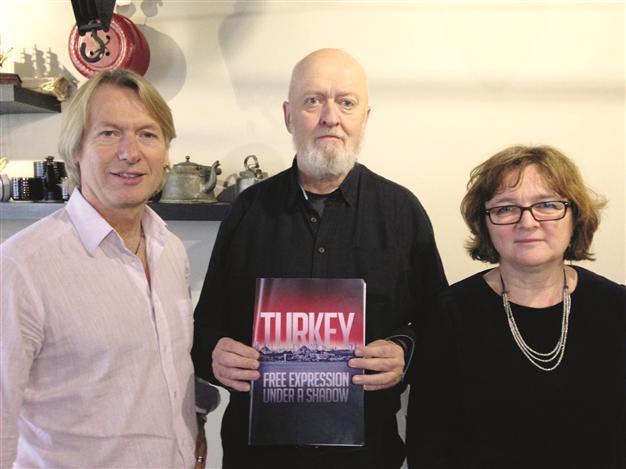Ban on graft probe reports is totally absurd: PEN
İpek Yezdani ISTANBUL

‘The fight against corruption is a central element of press freedom,’ PEN Norway head Carl Morten Iversen says.
The ban on reporting on the parliamentary inquiry into corruption allegations concerning four former Cabinet ministers is totally absurd and could not happen in a European democracy, according to PEN Norway Secretary General Carl Morten Iversen.
“One of the central elements of press freedom is the fight against corruption. So this is another obstacle for journalists. If you look at the developments of press freedom in Turkey, there will probably be more bans like this,” Iversen told daily Hurriyet on Nov. 27.
PEN Norway has launched a comprehensive new report titled “Turkey: Freedom of Expression under a Shadow,” which was presented with a group of Turkish journalists in Istanbul on Nov. 27.
Iversen suggested that the biggest concern over freedom of expression in Turkey is a “Combination of media ownership and obvious control of the media by the authorities, which leads to self-censorship.”
The ban on reporting about the Turkish Parliament’s corruption inquiry commission is a good example of “free expression under a shadow,” Norwegian Authors Association President Jørgen Lorentzen said.
“Writing about corruption is one of the first obligations for a journalist. Not having the ability to do so is undermining the possibility of establishing faith in each other,” Lorentzen added.
Lorentzen also mentioned that the “arbitrariness” in the application of laws regarding press freedom is very concerning to Turkish writers and journalists.
“They can prosecute people for taking part in a legal party or taking part in an academic workshop. Journalists are told which questions not to ask and which issues not to write about. That’s a huge and dramatic problem for press freedom,” he added.
The Coordinator of the Turkey Project in Norwegian PEN, Sara Whyatt, discussed the meeting of PEN International with Turkey’s then President Abdullah Gül in 2012.
“The discussion was frank. Among the topics raised were: The large numbers of writers then in prison and on trial; the use of anti-terror legislation to stifle dissent; writers who had served years of untried detention; and suppression of the Internet. Gül made an important observation when he recognized freedom of expression in his country was problematic by saying: ‘There are many good things unfolding in Turkey, but these concerns cast a shadow over the progress we are achieving.’ However the ‘shadow’ that places restraints on freedom of expression remains as critical in November 2014 as it was two years earlier,” Whyatt said.
The report mentioned that despite the number of writers and journalists in prison dropping from over 80 in 2012 to less than 20 today, the total number on trial remains unchanged, as many of those freed are still on trial and new trials have begun, notably on charges of defamation.
“Anti-terror legislation remains problematic for free expression, and there are a multitude of other laws that penalize free speech, as restrictions on the internet harden,” the report said.
